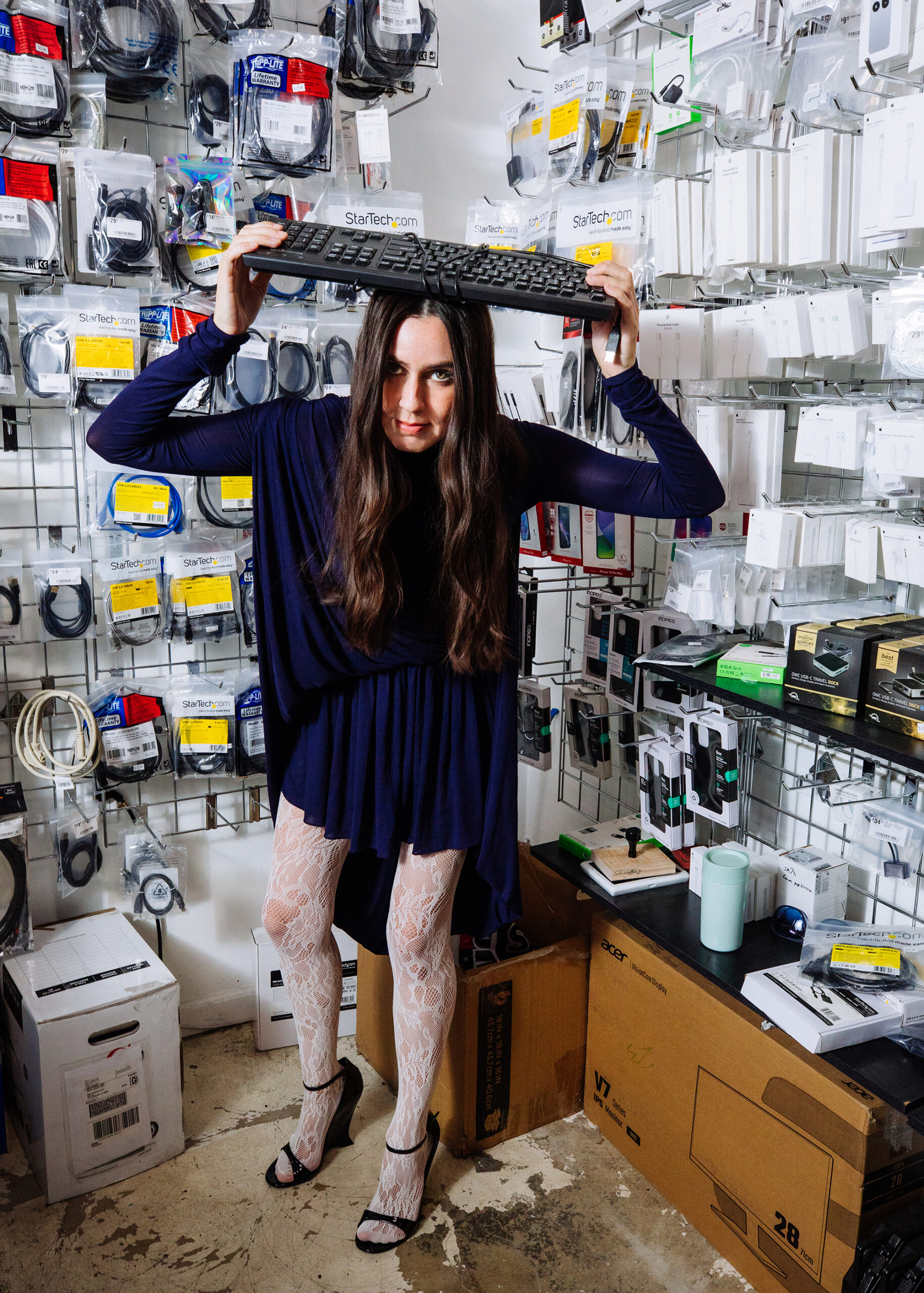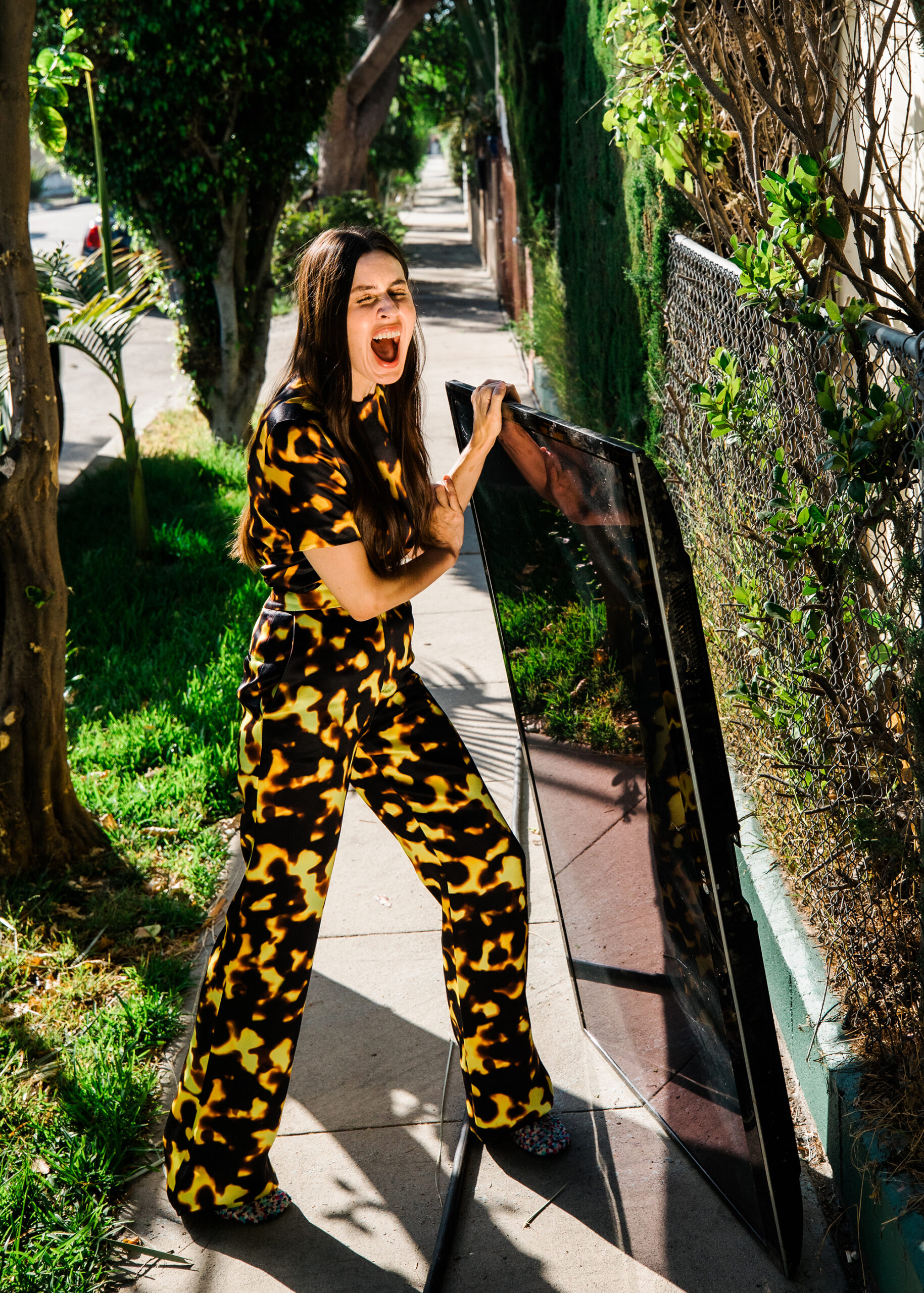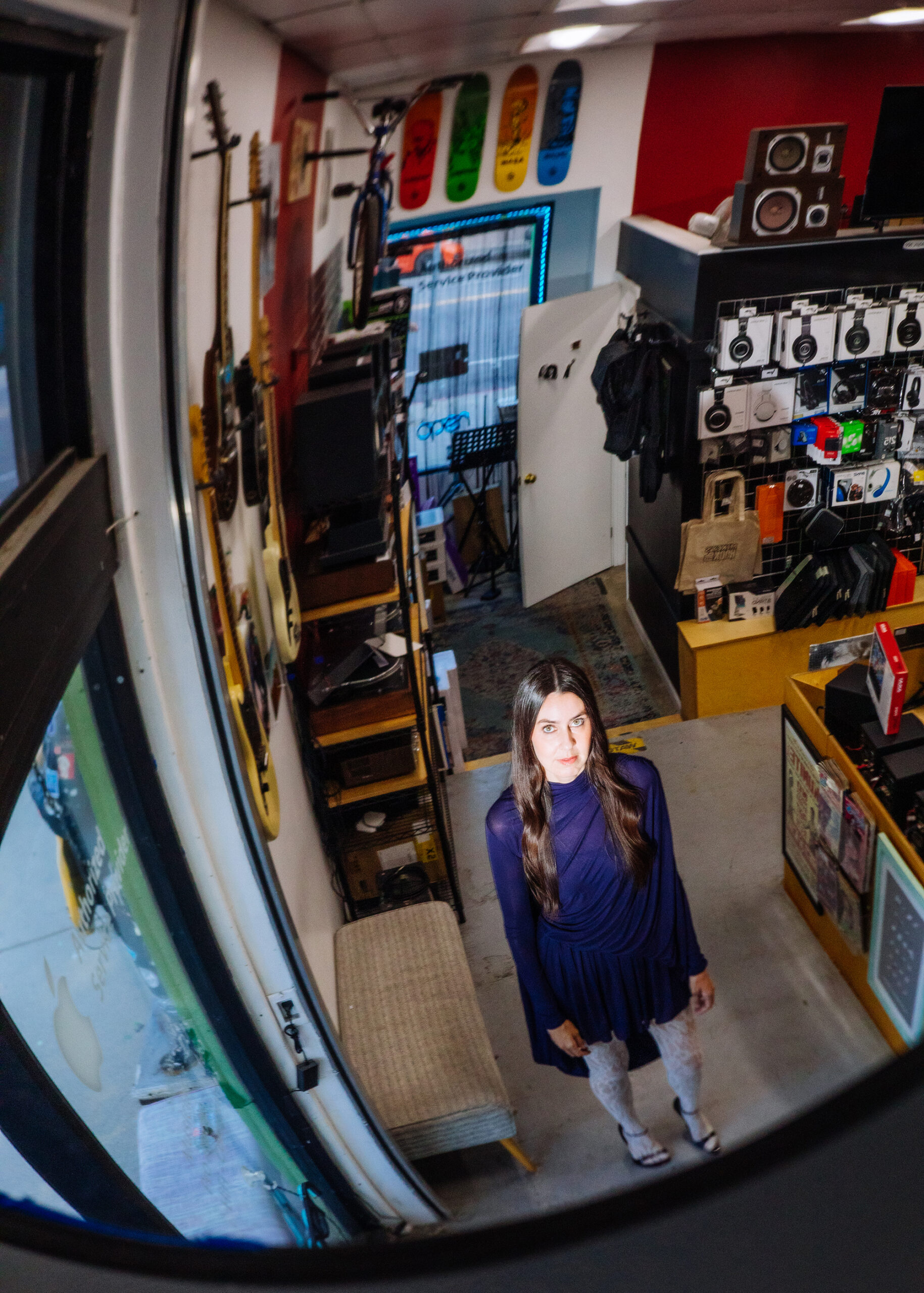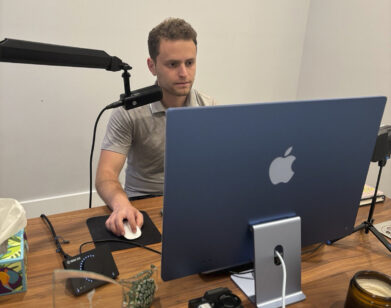JOURNALISM
Taylor Lorenz and Hasan Piker on Tumblr, Trolls, and Getting Doxxed
Extremely online journalist Taylor Lorenz chats with extremely online livestreamer Hasan Piker about getting trolled, screen time, and her new book, Extremely Online: The Untold Story of Fame, Influence, and Power on the Internet.
———
HASAN PIKER: Hello, Taylor Lorenz. How did you get your start in media? That’s my first question to you for Interview.
TAYLOR LORENZ: I got my start back in 2009. I, like many millennials, graduated into the recession when there were no jobs so I worked as a temp at a call center, and in retail, and a girl at one of my temp jobs introduced me to Tumblr. I started blogging and I got popular online.
PIKER: You were a Tumblr girlie?
LORENZ: [Laughs] Yeah. I had side bangs and everything.
PIKER: How did you first get attention as a writer?
LORENZ: When I started writing on Tumblr I was very critical of the mainstream media. A lot of my friends were making things online, and the way that traditional media was talking about them was so condescending, like, “Are bloggers even real journalists?” I wanted to write about the internet from the perspective of somebody who actually uses the internet. I started writing for a bunch of no-name blogs. A lot of them don’t exist anymore, but my first official byline was at The Daily Dot.
PIKER: I know The Daily Dot. It still exists.
LORENZ: They actually have great coverage of content creators.
PIKER: I just searched my name on The Daily Dot, and I’m seeing that they’ve written about me temporarily being banned from TikTok. “Hasan Piker says he went to a brothel, sparking debate. Leftist Hasan Piker sparks debate over his $2.7 million—” Oh, god.
LORENZ: They love to aggregate a bunch of mean tweets and just say, “Sparks debate.”
PIKER: Speaking of sparking debate, you have become the number one enemy of the right-wing media. They use you as a scapegoat all the time. Why do you think that’s happening?
LORENZ: I write about online influence, which is something that those people desperately want. The right was very early to recognize the power of the internet, and I think I’m very good at exposing the dynamics of virality and the mechanics of how a lot of these platforms work. Also, I’m an outspoken woman and I don’t mind talking back.
PIKER: Yeah. You’re not allowed to talk back as a woman, especially if you’re anywhere near the left. If you’re on the right, they give you a little bit of leeway, until they’re done with you. I don’t know if you want to talk about this, but I feel like Chaya Raichik [also known as Libs of TikTok] has been cyberstalking you. She’s constantly talking about you and AOC.
LORENZ: What interested me about Chaya was that her ascent to fame was very quick. She was anonymous, but if you’re going to amass millions of followers, monetize hate, shape legislation in this country—DeSantis’s press secretary said she had informed the thinking behind the “Don’t Say Gay” bill—you don’t deserve anonymity. And so, I wrote about her. Now, she monitors my internet presence 24/7 and seems very triggered by it.
PIKER: Yeah. She has a thing for the girlies. It’s a little odd.
LORENZ: It’s funny, every time I’ve ever asked her for comment [on a story], she makes it weird and sexual. I’m like, “I’m just asking you for comment and you’re bringing up dating me.” It’s bizarre. You have these women that have ascribed to this super regressive and repressive worldview and then they see people like me who are living freely and thriving, and there’s resentment.
PIKER: Yeah. I always go back to that Salon article, I think it was titled, “‘Alt-Right’ Women Are Upset That ‘Alt-Right Men’ Are Treating Them Terribly.” It’s like, “What did you expect?” You’re advocating for backwards, misogynistic values.
LORENZ: There’s a reason that the big stars on the right are not generally women.
PIKER: And, if you are a right-wing commentator, you need to fit a profile that fulfills the sexual desires of a male audience. How do you handle the trolls?
LORENZ: I’m fine with trolls. I cover YouTubers and content creators for a living, so I’m not a stranger to online drama. But I have very strong boundaries around my life and what I share online. There’s people that know me IRL and know my personality, and then there’s people that consider me to be this avatar online. Once you have a little bit of notoriety, you sort of lose the narrative about yourself. It’s up to the internet to decide if they love you or hate you that day.
PIKER: Yeah.
LORENZ: You have to have a really strong sense of self, because the days they hate you, it fucks with your head.
PIKER: What is one way that you’ve been able to escape the online world shaping how you see yourself?
LORENZ: It’s definitely a struggle—2020 was the hardest because I wasn’t having a lot of in-person interactions. Also, Tucker [Carlson] was coming for me all the time, and I was working at The New York Times, which was a very difficult place to work if you’re dealing with this type of thing. But now, I spend time with other people who know what it’s like. Living in L.A. has really helped me, because so many people here have an understanding of fame and the fact that what you read in the media is often bullshit.
PIKER: Absolutely. But real-world impacts have happened in your life as a consequence of your online work, and one of them is being doxxed. Do you want to explain to people what that’s like?
LORENZ: Being doxxed just means that somebody’s put all of your personal information on the internet. I cover content creators that have very dedicated fandoms, so even outside the right-wing craziness, I’ve been doxxed a million times. I’ve reported very critically on Jake Paul over the years, and his fans did just as much to me as the Tucker Carlson fans. They put my phone number out. I got SIM-swapped. People were trying to SWAT my apartment building. It’s terrifying to go through it the first time, but on the 15th time you’re like, “Okay, what are you going to do? Try to SWAT me again?” I’m at the point where I’m like, “These people are just pitiful and I don’t care.” Everything that can happen has happened. I mean, nobody’s tried to physically kill me, but I think most of what these people want to do is terrorize you. And once you accept it for what it is, it becomes less scary.
PIKER: I find it really tragic but funny that the stans behave identical to right-wing people. It’s inexcusable regardless, but it seems more understandable for a 14-year- old who’s really invested in Jake Paul to behave that way. It’s certainly not normal for a 35-year old divorced dad.
LORENZ: [Laughs]
PIKER: We’re devolving, partially as a consequence of being extremely online. Speaking of that, what’s your daily screen time look like?
LORENZ: Scary. I don’t even want to look.
PIKER: I’m going to look at mine.
LORENZ: Mine was only 10 hours and 25 minutes today.
PIKER: That’s insane. To be fair, I do a lot of my screen time on my PC, but my daily average is around six hours. Right now I’m at four hours and 40 minutes.
LORENZ: I feel like mine’s actually more because of, like you said, the laptop. Yours must be crazy because you stream for nine hours at a time.
PIKER: I do. Okay. So, one thing I’ve noticed is that a lot of hyper-niche online communities have a way of making people think that something small they’re paying attention to is very important.
LORENZ: I think that because everyone’s getting more online and there’s more niche monetization offerings, these micro-influencers can end up making a living and becoming really impactful. And also, people can be very loud on the internet. So you have these niche groups that seem a lot bigger than they are because of their online presence. I’m sure you deal with that a lot.
PIKER: Oh, yeah.
LORENZ: How do you see that evolving as somebody who’s trying to scale? How do you manage all of these disparate groups and still keep it all one community? I think it’s harder and harder to be a big creator and bring everybody together, unless you’re pandering to 5-year-olds like Mr. Beast does.
PIKER: I’m already in the leftist space which has historically been very susceptible to infighting, so I’ve always valued limited growth, because it’s better to foster a tight-knit community. That’s why I refused to give interviews to traditional outlets before you approached me for The New York Times. I didn’t want to get the ire and scrutiny that comes with that. I’ve gotten a lot more media coverage since the 2020 election cycle. And that has brought its own series of complications.
LORENZ: People hate to see other people winning. They want to feel like, “This is my favorite person, I discovered them, and they’re still the underdog.” Once you get that mainstream hype and attention, people feel a lot more comfortable tearing you down.
PIKER: Totally.
LORENZ: So let’s talk about how social media has changed since the last election. I actually think the first content-creator election was Trump’s.
PIKER: Yeah, 2016 and the rise of Bernie Sanders created a lot of opportunity for leftist content creators, myself included. A lot of people started recognizing that there is such a thing as the DSA, for example. It almost felt like a reawakening. But I didn’t see that much action during the 2020 election. If anything, social media is influencing the primaries for the Republican Party in the worst ways possible, because they’re hyper-focusing on these incredibly niche hateful campaigns, like the ones cooked up by Christopher Rufo that get elevated by the Matt Walshes of the world. But that’s making them seem gross to the broader audience of Republican voters, especially those in the margins that aren’t as obsessed with murdering trans people as they are. But I can’t say that the Democratic Party really gives a shit about the influencers. [Laughs]
LORENZ: No, but the 2016 election really did give rise to this whole crop of leftist content creators. Do you feel like that ecosystem is struggling?
PIKER: I think the pendulum shifted in the other direction very quickly because American politics and culture has an incredibly reactionary slant. Nothing came of the Black Lives Matter protests and that truly made a lot of young people tap out of politics altogether. They were like, “Well, we protested. There was a police precinct that burned down and nothing came of it. So, why the fuck would I ever do this again?” Then you have a new wave of right-wing Gamergate-style content from the Andrew Tates of the world that’s totally captivating younger generations and it is definitely a monkey see, monkey do situation.
LORENZ: I totally agree. These platforms, Twitter as the most prominent example, are built to reward people like Andrew Tate. I mean, Elon is literally paying tens of thousands of dollars to the most hateful creators on the app.
PIKER: Yeah, like End Wokeness and out-and-about white supremacists. It’s pretty awful.
LORENZ: I don’t see it changing, which is too bad. When the pandemic came, I was like, “Well, finally, maybe we’ll get universal healthcare.” That notion has died. No one even talks about it anymore. What do you think it’s going to take to fix that? Do we just need to build new social platforms, or are we totally fucked?
PIKER: The pendulum will inevitably swing in the other direction when social media apps realize they haven’t been moderating their communities enough. Given the lack of interest in having any sort of accountability for their own narratives, I see most right-wing content creators continuing to be as aggressively reactionary as possible until there is—well there’s definitely not going to be legislation passed, obviously, because Americans are terrified of any kind of restrictions on free speech. It’ll be up to the platforms to self-moderate.
LORENZ: I think there’s hope for subverting the current paradigm. More and more platforms are facilitating direct monetization or other forms of media that aren’t so reliant on ads and algorithmic distribution. There’s also been an explosion, in the past five to seven years, of e-commerce companies. You can launch merch and product lines easier now than ever. All of those provide new revenue pathways for creators and users outside of the TikTok Creator Fund, for example. I also think these platforms are getting really greedy. They want to take more and more from content creators. And I think eventually, you’re going to push people into monetizing in other ways. So, I don’t think it’s the users propping up the tech monopolies as much as it’s the government and the power structures within the U.S. that Facebook has had a monopoly on for quite a while. At one point, people were pursuing antitrust legislation against them, but that went away, I guess because TikTok gave them a challenge. But it’s notable that the only social app that could meaningfully challenge Facebook and Google came from a billion-dollar Chinese tech conglomerate. That’s the level of resources that you need to have to compete with these bigger apps. I would love to see a more diverse startup ecosystem in this country. But I think we need better tech policies and things like universal health care so people can actually start companies and be innovative.
PIKER: Yeah. I think breaking down tech monopolies is going to rely on the government, which I don’t even think it’s interested in doing. The actions they took towards TikTok signaled that they were more interested in preserving Silicon Valley billionaires over foreign billionaires with a tremendous amount of control over the American psyche.
LORENZ: Yeah, American billionaires can seize and misuse our data and manipulate elections, but god forbid another country’s product does anything like that. Also, let’s not forget that many members of Congress own stock in Facebook and have deep ties to these tech conglomerates. I also think most people in Congress don’t know how to turn on their own computer. So, I’m not holding my breath for any thoughtful legislation.
PIKER: And it’s only the lobbyists that write their legislation and they’re in the pocket. So they’re not going to do that.
LORENZ: We’re doomed. But users have a bit more power than they realize to shape these platforms. And one thing I noticed while writing my book is that there’s a push and pull tension between content creators that generate a huge amount of engagement on these apps and the apps themselves. Ever since the mid 2010s when Vine creators sort of took control of the app and ultimately abandoned it, leading to its decline, tech companies have gotten a lot more savvy. The boot comes down hard on any content creator that tries to exert too much influence on their platforms.
PIKER: Yeah.
LORENZ: I’m sure you deal with that yourself. It’s tough.
PIKER: Well, Twitch maintaining its livestream monopoly is good for me. [Laughs] No. I’m in favor of breaking that down. It just sucks that the only way to break down the major amount of livestream market share that Amazon holds [Amazon owns Twitch] was to ban gambling from Twitch, because all that happened was that crypto companies went and made their own gambling websites, which still rely on Amazon’s own web services. And that plays like an unregulated, unmoderated hole of despair.
LORENZ: That’s depressing. Well, let’s end on a high note. I hope that people love my book. Read my book, order my book. I don’t know if you have a copy of it yet, Hasan. But if not, I’ll get you one.
PIKER: I’m looking forward to it.
———
Hair: Karen Arechiga using Oribe and Leonor Greyl.
Makeup: Zaheer Sukhnandan using Mac Cosmetics.
Photography Assistant: Keegan Holden.
Fashion Assistant: Gabrielle Ram.
Location: Mikey’s Hook Up LA.










